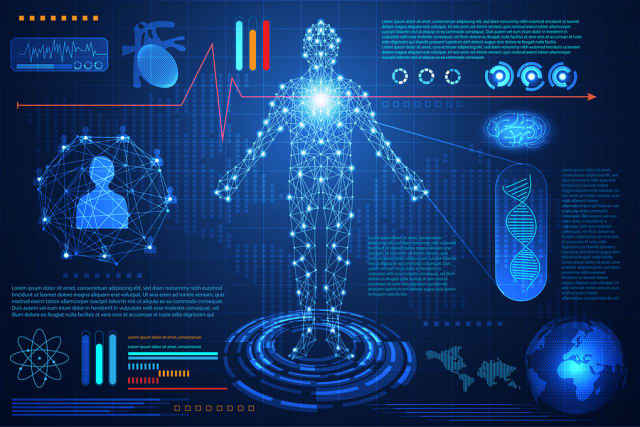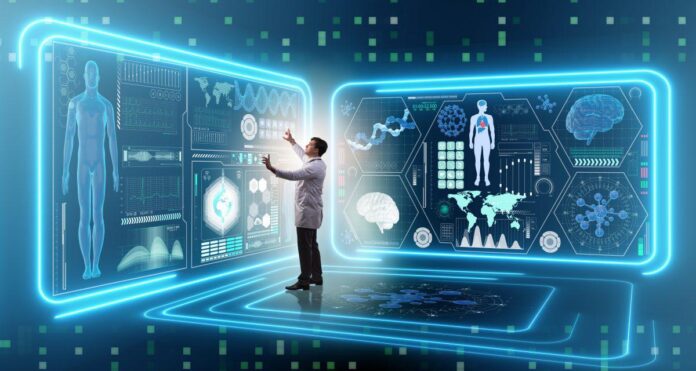Artificial intelligence (AI) is rapidly changing how healthcare is delivered, with the potential to transform the industry in previously unimaginable ways. From diagnosis and treatment to drug development and patient care, AI is playing an increasingly important role in improving the quality of healthcare and making it more accessible to people around the world.
One critical field where AI is impacting is the analysis of medical data. By analyzing large amounts of electronic health records and other data, AI algorithms can identify patterns and trends that would be impossible for humans to discern. Healthcare professionals can depend on these results to make more accurate diagnoses, predict patient outcomes, and recommend personalized treatment plans.
Another area where AI is having an impact is drug discovery and development. By analyzing data on the properties and effects of different drugs, AI can identify potential candidates for further testing and help to optimize clinical trial design, reducing the time and cost of bringing new treatments to market.
AI is also being used to improve the efficiency of healthcare delivery. For example, AI can automate routine tasks, such as scheduling appointments and processing insurance claims, freeing healthcare professionals to focus on more complex tasks. AI can also provide personalized recommendations and support self-care, improving patient outcomes and the overall quality of care.
Applications Of Artificial Intelligence In Healthcare

- Clinical decision support: AI can analyze patient data and provide recommendations for diagnosis and treatment. For example, a machine learning algorithm might be trained on a large dataset of medical records to identify patterns that are indicative of a particular disease. By analyzing a patient’s medical history and other relevant data, the AI system can provide a list of potential diagnoses and treatment options for a healthcare provider to consider.
- Drug discovery: AI can be used to identify potential drug candidates and predict their efficacy and safety. For example, a machine learning algorithm might be trained on a dataset of chemical compounds and their known effects on the body. The AI system could then search for new compounds with the desired therapeutic effect and are likely safe for human use.
- Predictive analytics: AI can predict patient outcomes and identify individuals at risk for certain conditions. For example, an AI system might be trained on a large dataset of patient records and used to identify individuals at risk for developing certain chronic diseases, helpful to provide targeted prevention and treatment recommendations to help reduce the risk of these conditions.
- Medical image analysis: AI can analyze medical images, such as X-rays or MRIs, to identify abnormalities or diagnose conditions. For example, a machine learning algorithm might be trained on a dataset of images and their corresponding diagnoses and used to identify abnormalities in new images.
- Natural language processing: AI can analyze and interpret large volumes of unstructured medical data, such as electronic medical records or clinical notes. By analyzing this data, AI systems can identify patterns and trends that may be useful for diagnosis and treatment planning.
- Personalized medicine: AI can tailor treatment plans to individual patients based on their unique characteristics and medical history. The AI system can provide customized treatment recommendations based on the patient’s unique characteristics by analyzing a patient’s medical history and other relevant data. For example, an AI system might be trained on a large dataset of patient records and used to identify patterns associated with particular treatments.
- Medical education: AI can be used to provide personalized learning experiences for medical students and professionals. For example, an AI system might be used to create customized study plans and quizzes based on an individual’s knowledge and skills. Medical students and professionals can practice them to stay updated on the latest developments in their field and improve their knowledge and skills.
- Clinical trial management: AI can streamline the process of conducting clinical trials and improve the efficiency of the research process. For example, an AI system might be used to identify eligible participants, monitor patient progress, and analyze data from the trial.
- Population health management: AI can be used to identify trends and patterns in the health of a population and identify risk factors for specific conditions. It can help develop targeted prevention and treatment strategies to improve the overall health of people.
- Administrative tasks: AI can automate administrative tasks, such as scheduling appointments, processing insurance claims, and managing electronic medical records, freeing up healthcare providers to focus on patient care and improving the efficiency of the healthcare system.
The applications of AI in healthcare are vast and varied, and the use of AI has the potential to greatly improve patient outcomes, reduce costs, and increase efficiency in the healthcare system. However, it is crucial to ensure that AI systems are developed, used ethically, tested, and validated to ensure their accuracy and reliability.
Tags – Applications of Artificial Intelligence in Healthcare, Artificial Intelligence in Healthcare From Clinical Decision Support to Drug Discovery, Applications of Artificial Intelligence, Artificial Intelligence in Healthcare
